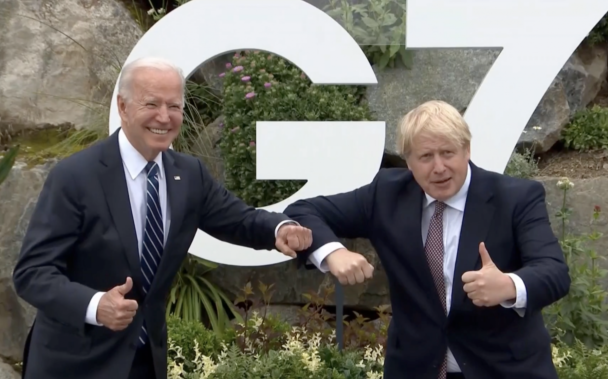US President Joe Biden and UK Prime Minister Boris Johnson at the G7 Summit in Cornwall, England, June 10, 2017
Joe Biden’s first foray abroad as President is intended to be a reset for America’s place in the world. In a multi-meeting trip, Biden is seeking to draw a line under the Trump years and demonstrate the value of American leadership and a collective approach to the word’s problems: “America is Back”.
Biden’s decision to participate in the G7, US-EU, and NATO summits ahead of his meeting in Geneva with Russian leader Vladimir Putin is an orchestrated attempt to align America’s allies in defence of Western values, in the face of mounting challenges from Russia and China.
It is in this context that the US and UK have signed a “new” Atlantic Charter, intended to show the continuity and strength of relations by invoking the 1941 version between Franklin Roosevelt and Winston Churchill. The 2021 document outlines a joint commitment to defending democracy, free and fair trade, and bolstering collective security in the face of challenges such as cyber-attacks and climate change. As the host of the G7 meeting in Cornwall and November’s COP 27 summit in Glasgow on climate change, the UK is in a key position to drive these agendas and shape their results. Washington has sought to mark that role by this diplomatic gesture.
See also EA on Monocle 24 and Radio FM4: Joe Biden, Boris Johnson, and the G7 Summit
But Biden’s visit is also the first to take place since the UK left the EU on December 31, and the fallout from Brexit is a significant undercurrent this week. Washington has challenged the UK’s demand that the arrangements for trade between Northern Ireland and Great Britain be renegotiated: the message is that London should fall into line with the letter of the law agreed with the EU. In a diplomatic démarche, the US made clear to the UK that the preservation of peace in Northern Ireland is a higher priority than trade in sausages, and the UK should act accordingly.
See also US Reprimand to UK: Sort Yourselves Out on Brexit and Northern Ireland
In the wake of the Trump Presidency, Biden is trying to shore up the rules-based international order and the value of multilateralism. He cannot be seen to condone an ally who seems keen to unilaterally interpret international law for national purposes. So the UK finds that, collectively, America’s European allies matter more to the US than London does — and international law matters more than ties of history and language.
See also EA on Radio: Burying the Myth of the US-UK “Special Relationship”
The UK used to be America’s main ally in Europe, but this was primarily because of the influence than London had in Brussels. Washington could rely upon the British to sway EU opinion in a favored direction for example, with a more robust stance towards both Moscow and Beijing. In sharp contrast, when Biden meets EU leaders next week, the UK will not be at the table.
Biden has previously indicated that he thinks Brexit was a mistake for the UK. Standing alone outside the EU, the UK may now find itself pressured to take a more hardline position towards China than its trade needs would welcome. Such are the consequences and foreign policy dilemmas of the new “global Britain” position.
The new Atlantic Charter is an attempt to reinvent UK-US relations for the post-Brexit age. In embracing the need for action on climate change and the global distribution of Coronavirus vaccines, the UK is keen to demonstrate its common agenda and continuing relevance to Washington. The Biden Administration will use the symbolism to nudge the UK closer to its more hawkish approach to China.
However, the pivotal role that Britain has played for last 80 years between Europe and America has changed. The new Atlantic Charter is both a recognition of this and an attempt to substitute a new agenda.
Prime Minister Boris Johnson is reportedly keen to find new language to replace the “needy and weak” term special relationship. Much more will be needed than a turn of phrase. The task will be for London to find a new policy, both towards the US and towards the Europeans whom it is currently antagonizing.

